Challenges Faced by Pre-Intermediate EFL Learners in Learning Expository Texts
VerifiedAdded on 2023/06/10
|11
|2985
|272
AI Summary
This essay discusses the challenges faced by pre-intermediate EFL learners in learning expository texts. It defines expository texts, explains the difference between main and supporting ideas, and discusses the strategies to identify them. The essay highlights the lack of motivation, shyness, fear of making mistakes, insufficient resources, and overcrowded classrooms as some of the major problems faced by EFL learners. The essay concludes with some recommendations for addressing these issues.
Contribute Materials
Your contribution can guide someone’s learning journey. Share your
documents today.
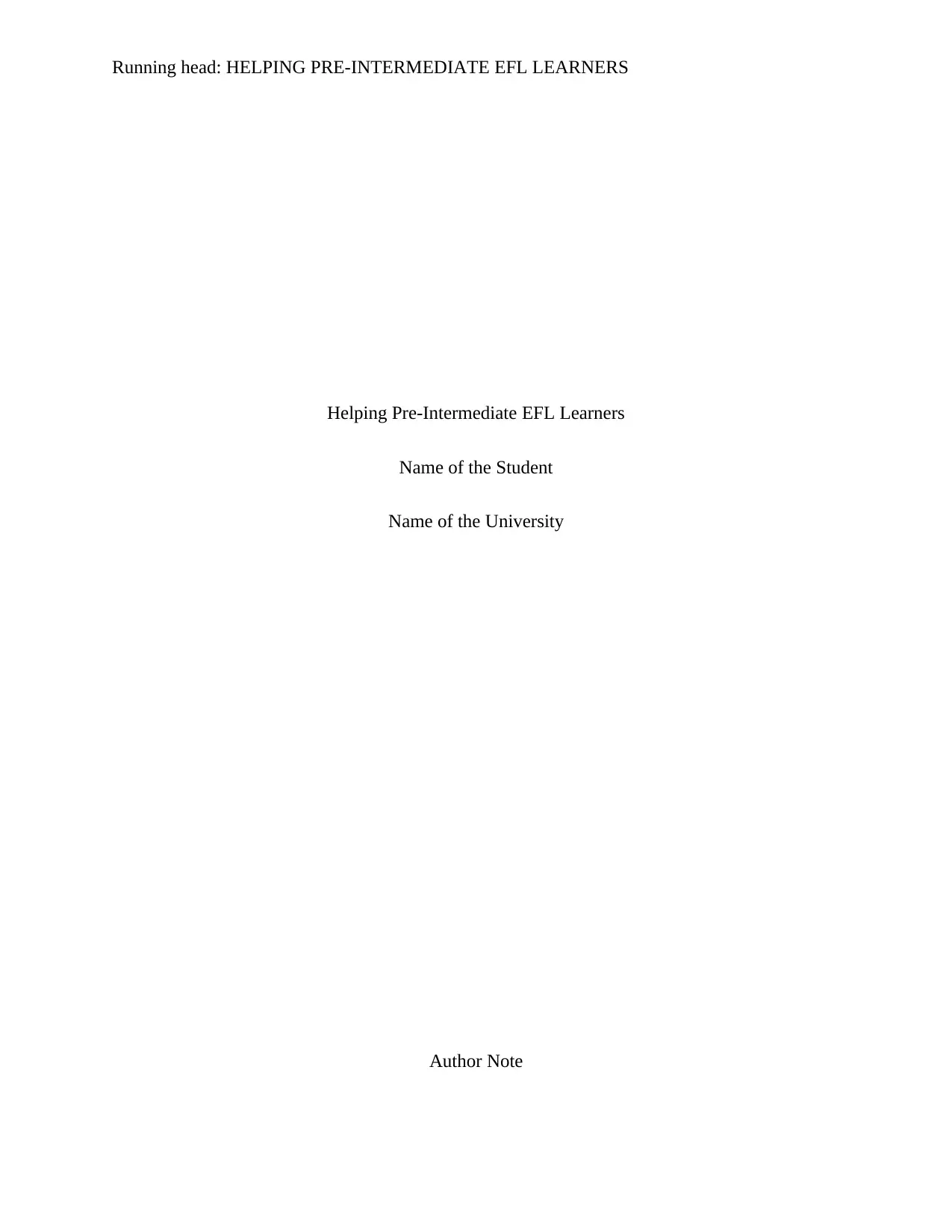
Running head: HELPING PRE-INTERMEDIATE EFL LEARNERS
Helping Pre-Intermediate EFL Learners
Name of the Student
Name of the University
Author Note
Helping Pre-Intermediate EFL Learners
Name of the Student
Name of the University
Author Note
Secure Best Marks with AI Grader
Need help grading? Try our AI Grader for instant feedback on your assignments.
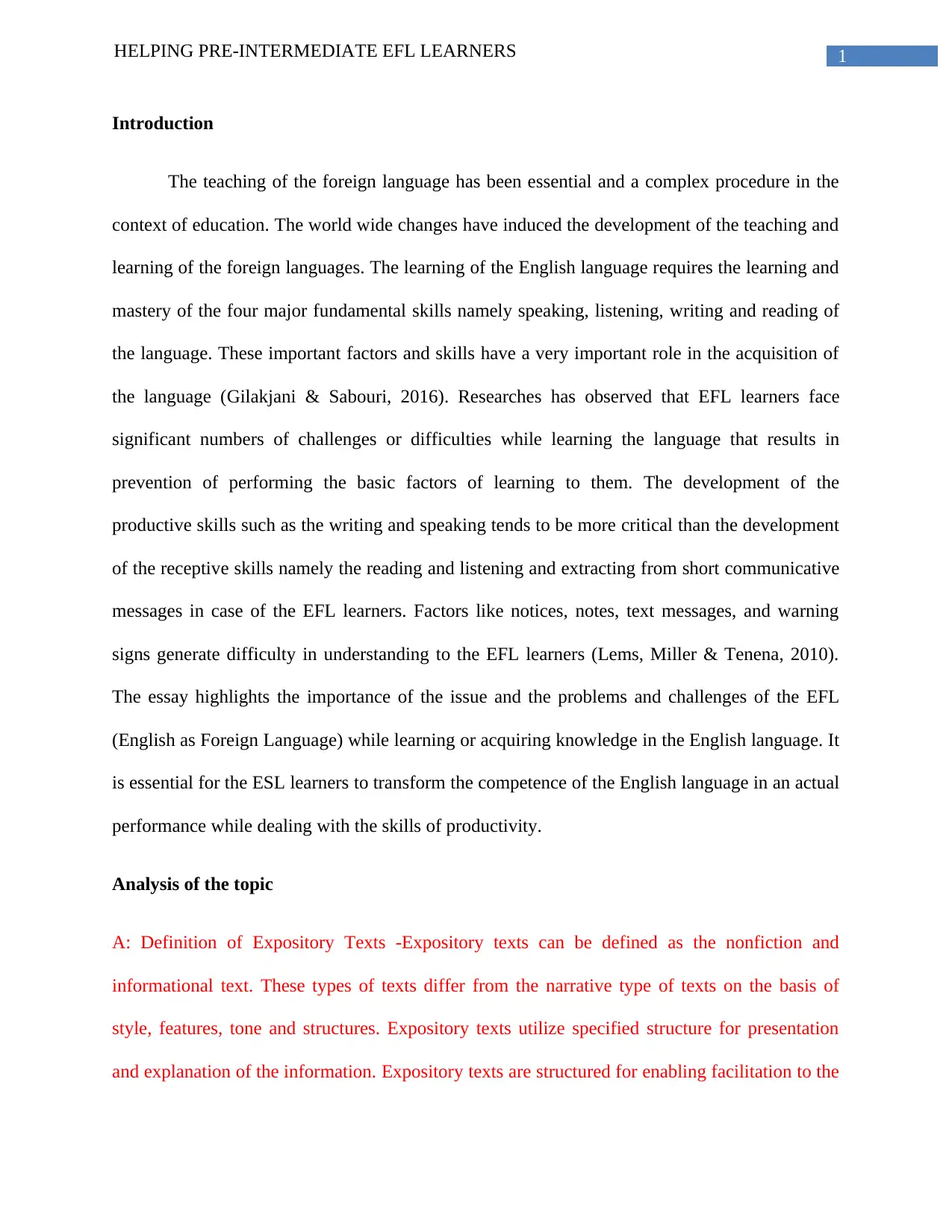
1HELPING PRE-INTERMEDIATE EFL LEARNERS
Introduction
The teaching of the foreign language has been essential and a complex procedure in the
context of education. The world wide changes have induced the development of the teaching and
learning of the foreign languages. The learning of the English language requires the learning and
mastery of the four major fundamental skills namely speaking, listening, writing and reading of
the language. These important factors and skills have a very important role in the acquisition of
the language (Gilakjani & Sabouri, 2016). Researches has observed that EFL learners face
significant numbers of challenges or difficulties while learning the language that results in
prevention of performing the basic factors of learning to them. The development of the
productive skills such as the writing and speaking tends to be more critical than the development
of the receptive skills namely the reading and listening and extracting from short communicative
messages in case of the EFL learners. Factors like notices, notes, text messages, and warning
signs generate difficulty in understanding to the EFL learners (Lems, Miller & Tenena, 2010).
The essay highlights the importance of the issue and the problems and challenges of the EFL
(English as Foreign Language) while learning or acquiring knowledge in the English language. It
is essential for the ESL learners to transform the competence of the English language in an actual
performance while dealing with the skills of productivity.
Analysis of the topic
A: Definition of Expository Texts -Expository texts can be defined as the nonfiction and
informational text. These types of texts differ from the narrative type of texts on the basis of
style, features, tone and structures. Expository texts utilize specified structure for presentation
and explanation of the information. Expository texts are structured for enabling facilitation to the
Introduction
The teaching of the foreign language has been essential and a complex procedure in the
context of education. The world wide changes have induced the development of the teaching and
learning of the foreign languages. The learning of the English language requires the learning and
mastery of the four major fundamental skills namely speaking, listening, writing and reading of
the language. These important factors and skills have a very important role in the acquisition of
the language (Gilakjani & Sabouri, 2016). Researches has observed that EFL learners face
significant numbers of challenges or difficulties while learning the language that results in
prevention of performing the basic factors of learning to them. The development of the
productive skills such as the writing and speaking tends to be more critical than the development
of the receptive skills namely the reading and listening and extracting from short communicative
messages in case of the EFL learners. Factors like notices, notes, text messages, and warning
signs generate difficulty in understanding to the EFL learners (Lems, Miller & Tenena, 2010).
The essay highlights the importance of the issue and the problems and challenges of the EFL
(English as Foreign Language) while learning or acquiring knowledge in the English language. It
is essential for the ESL learners to transform the competence of the English language in an actual
performance while dealing with the skills of productivity.
Analysis of the topic
A: Definition of Expository Texts -Expository texts can be defined as the nonfiction and
informational text. These types of texts differ from the narrative type of texts on the basis of
style, features, tone and structures. Expository texts utilize specified structure for presentation
and explanation of the information. Expository texts are structured for enabling facilitation to the
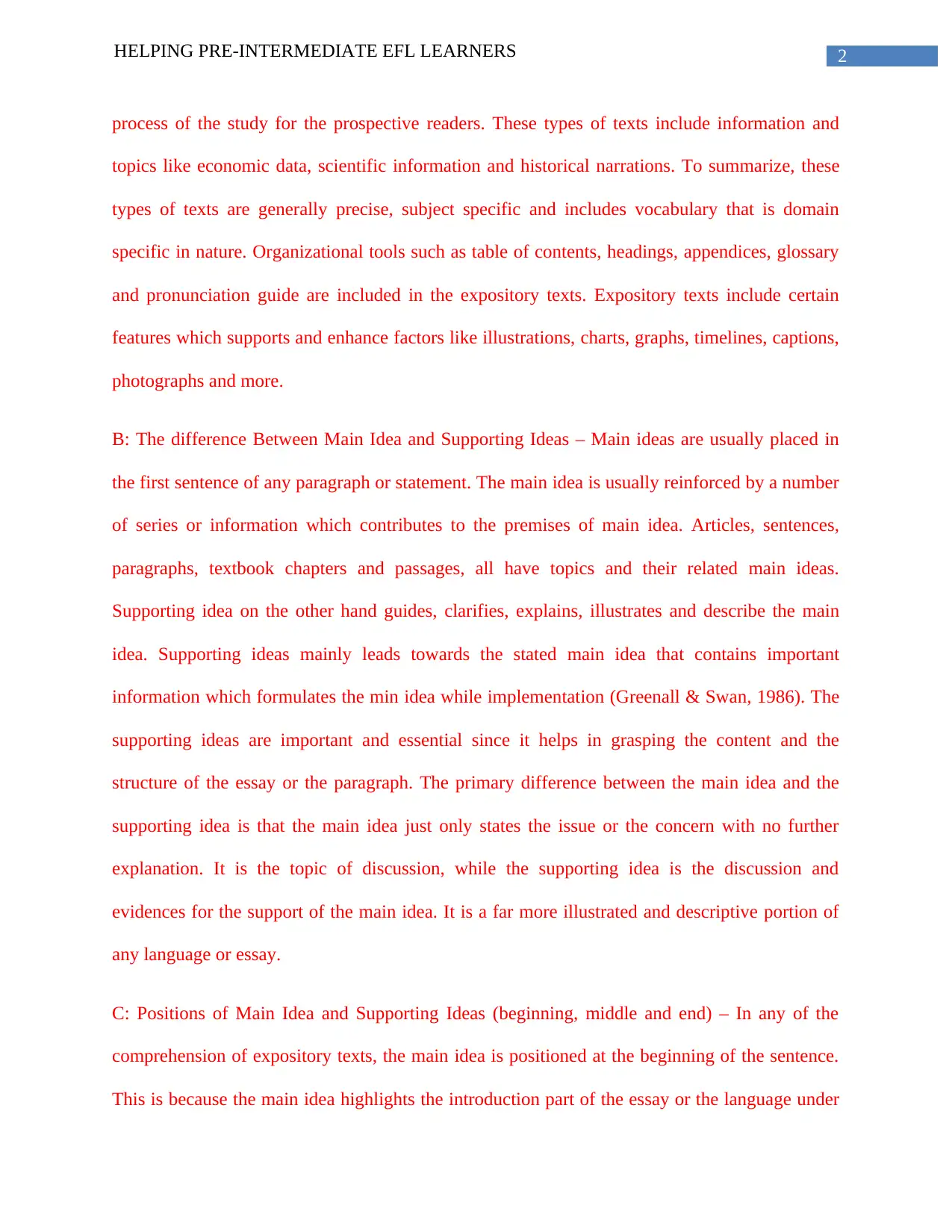
2HELPING PRE-INTERMEDIATE EFL LEARNERS
process of the study for the prospective readers. These types of texts include information and
topics like economic data, scientific information and historical narrations. To summarize, these
types of texts are generally precise, subject specific and includes vocabulary that is domain
specific in nature. Organizational tools such as table of contents, headings, appendices, glossary
and pronunciation guide are included in the expository texts. Expository texts include certain
features which supports and enhance factors like illustrations, charts, graphs, timelines, captions,
photographs and more.
B: The difference Between Main Idea and Supporting Ideas – Main ideas are usually placed in
the first sentence of any paragraph or statement. The main idea is usually reinforced by a number
of series or information which contributes to the premises of main idea. Articles, sentences,
paragraphs, textbook chapters and passages, all have topics and their related main ideas.
Supporting idea on the other hand guides, clarifies, explains, illustrates and describe the main
idea. Supporting ideas mainly leads towards the stated main idea that contains important
information which formulates the min idea while implementation (Greenall & Swan, 1986). The
supporting ideas are important and essential since it helps in grasping the content and the
structure of the essay or the paragraph. The primary difference between the main idea and the
supporting idea is that the main idea just only states the issue or the concern with no further
explanation. It is the topic of discussion, while the supporting idea is the discussion and
evidences for the support of the main idea. It is a far more illustrated and descriptive portion of
any language or essay.
C: Positions of Main Idea and Supporting Ideas (beginning, middle and end) – In any of the
comprehension of expository texts, the main idea is positioned at the beginning of the sentence.
This is because the main idea highlights the introduction part of the essay or the language under
process of the study for the prospective readers. These types of texts include information and
topics like economic data, scientific information and historical narrations. To summarize, these
types of texts are generally precise, subject specific and includes vocabulary that is domain
specific in nature. Organizational tools such as table of contents, headings, appendices, glossary
and pronunciation guide are included in the expository texts. Expository texts include certain
features which supports and enhance factors like illustrations, charts, graphs, timelines, captions,
photographs and more.
B: The difference Between Main Idea and Supporting Ideas – Main ideas are usually placed in
the first sentence of any paragraph or statement. The main idea is usually reinforced by a number
of series or information which contributes to the premises of main idea. Articles, sentences,
paragraphs, textbook chapters and passages, all have topics and their related main ideas.
Supporting idea on the other hand guides, clarifies, explains, illustrates and describe the main
idea. Supporting ideas mainly leads towards the stated main idea that contains important
information which formulates the min idea while implementation (Greenall & Swan, 1986). The
supporting ideas are important and essential since it helps in grasping the content and the
structure of the essay or the paragraph. The primary difference between the main idea and the
supporting idea is that the main idea just only states the issue or the concern with no further
explanation. It is the topic of discussion, while the supporting idea is the discussion and
evidences for the support of the main idea. It is a far more illustrated and descriptive portion of
any language or essay.
C: Positions of Main Idea and Supporting Ideas (beginning, middle and end) – In any of the
comprehension of expository texts, the main idea is positioned at the beginning of the sentence.
This is because the main idea highlights the introduction part of the essay or the language under
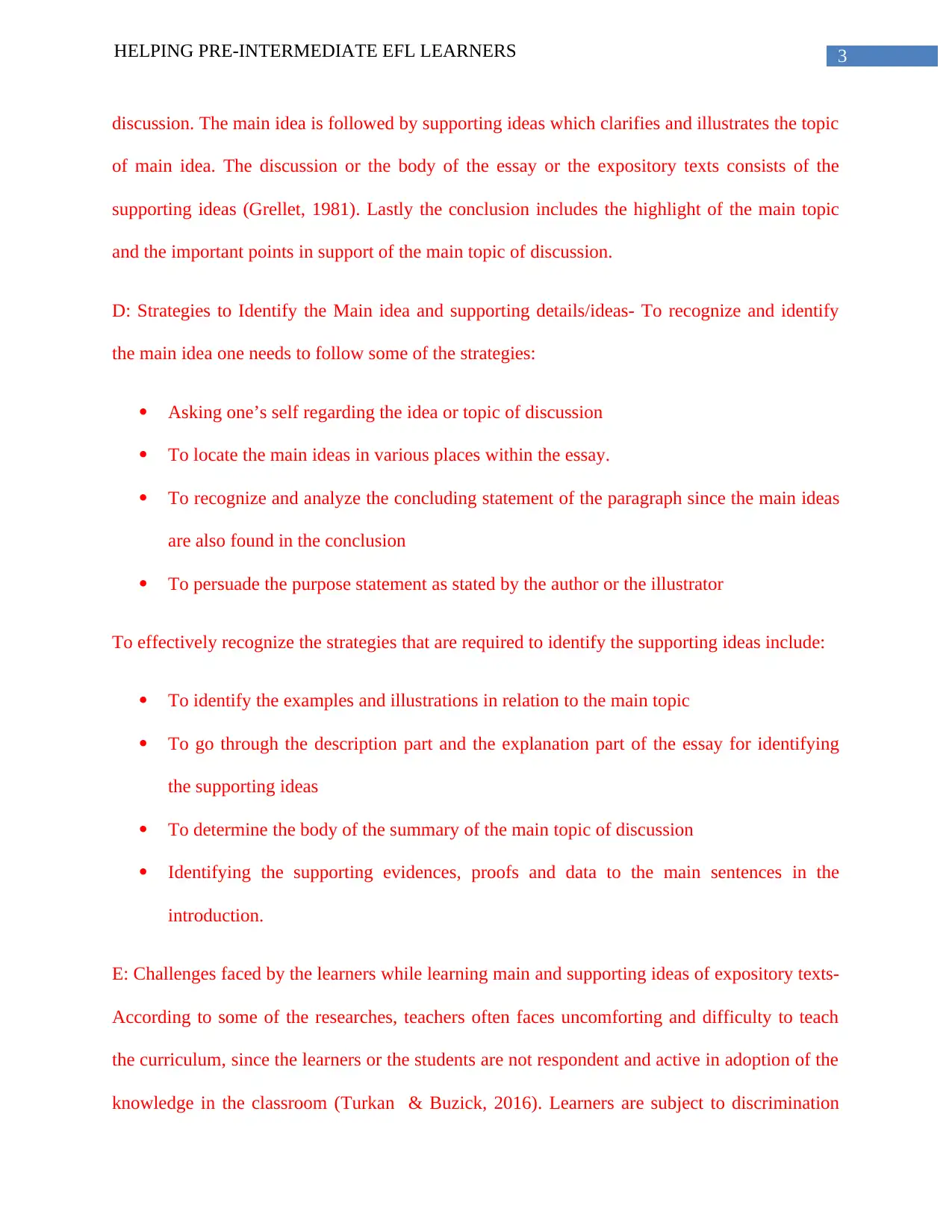
3HELPING PRE-INTERMEDIATE EFL LEARNERS
discussion. The main idea is followed by supporting ideas which clarifies and illustrates the topic
of main idea. The discussion or the body of the essay or the expository texts consists of the
supporting ideas (Grellet, 1981). Lastly the conclusion includes the highlight of the main topic
and the important points in support of the main topic of discussion.
D: Strategies to Identify the Main idea and supporting details/ideas- To recognize and identify
the main idea one needs to follow some of the strategies:
Asking one’s self regarding the idea or topic of discussion
To locate the main ideas in various places within the essay.
To recognize and analyze the concluding statement of the paragraph since the main ideas
are also found in the conclusion
To persuade the purpose statement as stated by the author or the illustrator
To effectively recognize the strategies that are required to identify the supporting ideas include:
To identify the examples and illustrations in relation to the main topic
To go through the description part and the explanation part of the essay for identifying
the supporting ideas
To determine the body of the summary of the main topic of discussion
Identifying the supporting evidences, proofs and data to the main sentences in the
introduction.
E: Challenges faced by the learners while learning main and supporting ideas of expository texts-
According to some of the researches, teachers often faces uncomforting and difficulty to teach
the curriculum, since the learners or the students are not respondent and active in adoption of the
knowledge in the classroom (Turkan & Buzick, 2016). Learners are subject to discrimination
discussion. The main idea is followed by supporting ideas which clarifies and illustrates the topic
of main idea. The discussion or the body of the essay or the expository texts consists of the
supporting ideas (Grellet, 1981). Lastly the conclusion includes the highlight of the main topic
and the important points in support of the main topic of discussion.
D: Strategies to Identify the Main idea and supporting details/ideas- To recognize and identify
the main idea one needs to follow some of the strategies:
Asking one’s self regarding the idea or topic of discussion
To locate the main ideas in various places within the essay.
To recognize and analyze the concluding statement of the paragraph since the main ideas
are also found in the conclusion
To persuade the purpose statement as stated by the author or the illustrator
To effectively recognize the strategies that are required to identify the supporting ideas include:
To identify the examples and illustrations in relation to the main topic
To go through the description part and the explanation part of the essay for identifying
the supporting ideas
To determine the body of the summary of the main topic of discussion
Identifying the supporting evidences, proofs and data to the main sentences in the
introduction.
E: Challenges faced by the learners while learning main and supporting ideas of expository texts-
According to some of the researches, teachers often faces uncomforting and difficulty to teach
the curriculum, since the learners or the students are not respondent and active in adoption of the
knowledge in the classroom (Turkan & Buzick, 2016). Learners are subject to discrimination
Secure Best Marks with AI Grader
Need help grading? Try our AI Grader for instant feedback on your assignments.
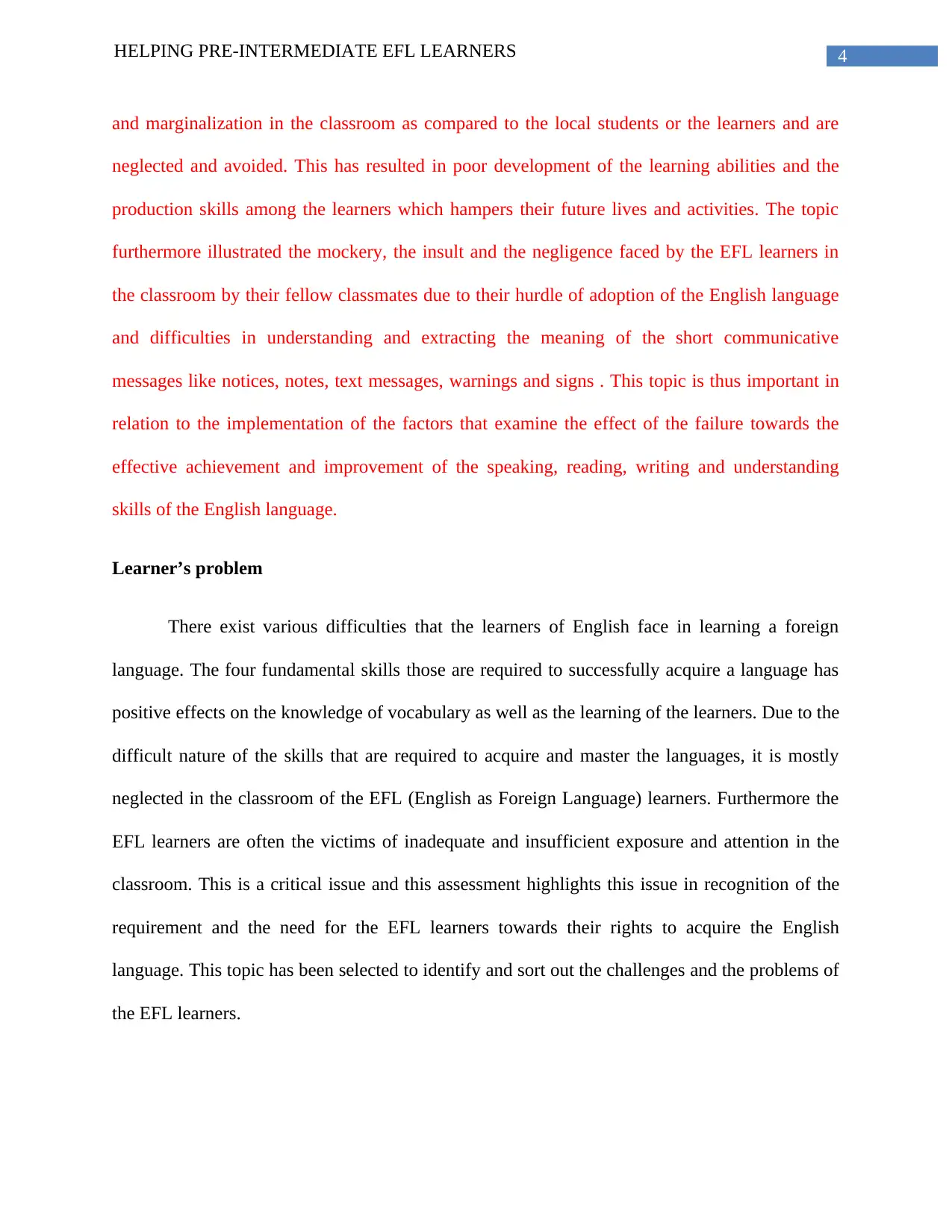
4HELPING PRE-INTERMEDIATE EFL LEARNERS
and marginalization in the classroom as compared to the local students or the learners and are
neglected and avoided. This has resulted in poor development of the learning abilities and the
production skills among the learners which hampers their future lives and activities. The topic
furthermore illustrated the mockery, the insult and the negligence faced by the EFL learners in
the classroom by their fellow classmates due to their hurdle of adoption of the English language
and difficulties in understanding and extracting the meaning of the short communicative
messages like notices, notes, text messages, warnings and signs . This topic is thus important in
relation to the implementation of the factors that examine the effect of the failure towards the
effective achievement and improvement of the speaking, reading, writing and understanding
skills of the English language.
Learner’s problem
There exist various difficulties that the learners of English face in learning a foreign
language. The four fundamental skills those are required to successfully acquire a language has
positive effects on the knowledge of vocabulary as well as the learning of the learners. Due to the
difficult nature of the skills that are required to acquire and master the languages, it is mostly
neglected in the classroom of the EFL (English as Foreign Language) learners. Furthermore the
EFL learners are often the victims of inadequate and insufficient exposure and attention in the
classroom. This is a critical issue and this assessment highlights this issue in recognition of the
requirement and the need for the EFL learners towards their rights to acquire the English
language. This topic has been selected to identify and sort out the challenges and the problems of
the EFL learners.
and marginalization in the classroom as compared to the local students or the learners and are
neglected and avoided. This has resulted in poor development of the learning abilities and the
production skills among the learners which hampers their future lives and activities. The topic
furthermore illustrated the mockery, the insult and the negligence faced by the EFL learners in
the classroom by their fellow classmates due to their hurdle of adoption of the English language
and difficulties in understanding and extracting the meaning of the short communicative
messages like notices, notes, text messages, warnings and signs . This topic is thus important in
relation to the implementation of the factors that examine the effect of the failure towards the
effective achievement and improvement of the speaking, reading, writing and understanding
skills of the English language.
Learner’s problem
There exist various difficulties that the learners of English face in learning a foreign
language. The four fundamental skills those are required to successfully acquire a language has
positive effects on the knowledge of vocabulary as well as the learning of the learners. Due to the
difficult nature of the skills that are required to acquire and master the languages, it is mostly
neglected in the classroom of the EFL (English as Foreign Language) learners. Furthermore the
EFL learners are often the victims of inadequate and insufficient exposure and attention in the
classroom. This is a critical issue and this assessment highlights this issue in recognition of the
requirement and the need for the EFL learners towards their rights to acquire the English
language. This topic has been selected to identify and sort out the challenges and the problems of
the EFL learners.
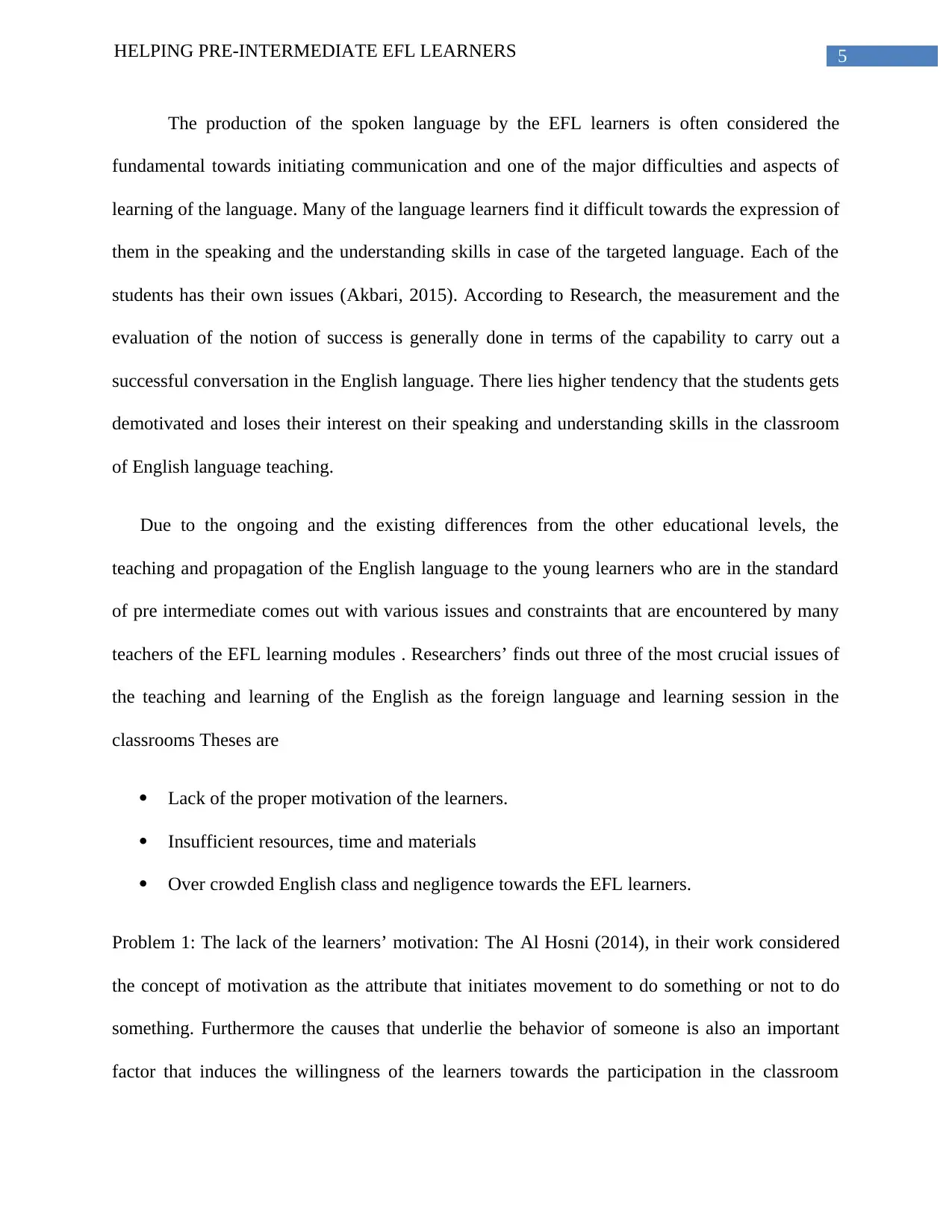
5HELPING PRE-INTERMEDIATE EFL LEARNERS
The production of the spoken language by the EFL learners is often considered the
fundamental towards initiating communication and one of the major difficulties and aspects of
learning of the language. Many of the language learners find it difficult towards the expression of
them in the speaking and the understanding skills in case of the targeted language. Each of the
students has their own issues (Akbari, 2015). According to Research, the measurement and the
evaluation of the notion of success is generally done in terms of the capability to carry out a
successful conversation in the English language. There lies higher tendency that the students gets
demotivated and loses their interest on their speaking and understanding skills in the classroom
of English language teaching.
Due to the ongoing and the existing differences from the other educational levels, the
teaching and propagation of the English language to the young learners who are in the standard
of pre intermediate comes out with various issues and constraints that are encountered by many
teachers of the EFL learning modules . Researchers’ finds out three of the most crucial issues of
the teaching and learning of the English as the foreign language and learning session in the
classrooms Theses are
Lack of the proper motivation of the learners.
Insufficient resources, time and materials
Over crowded English class and negligence towards the EFL learners.
Problem 1: The lack of the learners’ motivation: The Al Hosni (2014), in their work considered
the concept of motivation as the attribute that initiates movement to do something or not to do
something. Furthermore the causes that underlie the behavior of someone is also an important
factor that induces the willingness of the learners towards the participation in the classroom
The production of the spoken language by the EFL learners is often considered the
fundamental towards initiating communication and one of the major difficulties and aspects of
learning of the language. Many of the language learners find it difficult towards the expression of
them in the speaking and the understanding skills in case of the targeted language. Each of the
students has their own issues (Akbari, 2015). According to Research, the measurement and the
evaluation of the notion of success is generally done in terms of the capability to carry out a
successful conversation in the English language. There lies higher tendency that the students gets
demotivated and loses their interest on their speaking and understanding skills in the classroom
of English language teaching.
Due to the ongoing and the existing differences from the other educational levels, the
teaching and propagation of the English language to the young learners who are in the standard
of pre intermediate comes out with various issues and constraints that are encountered by many
teachers of the EFL learning modules . Researchers’ finds out three of the most crucial issues of
the teaching and learning of the English as the foreign language and learning session in the
classrooms Theses are
Lack of the proper motivation of the learners.
Insufficient resources, time and materials
Over crowded English class and negligence towards the EFL learners.
Problem 1: The lack of the learners’ motivation: The Al Hosni (2014), in their work considered
the concept of motivation as the attribute that initiates movement to do something or not to do
something. Furthermore the causes that underlie the behavior of someone is also an important
factor that induces the willingness of the learners towards the participation in the classroom
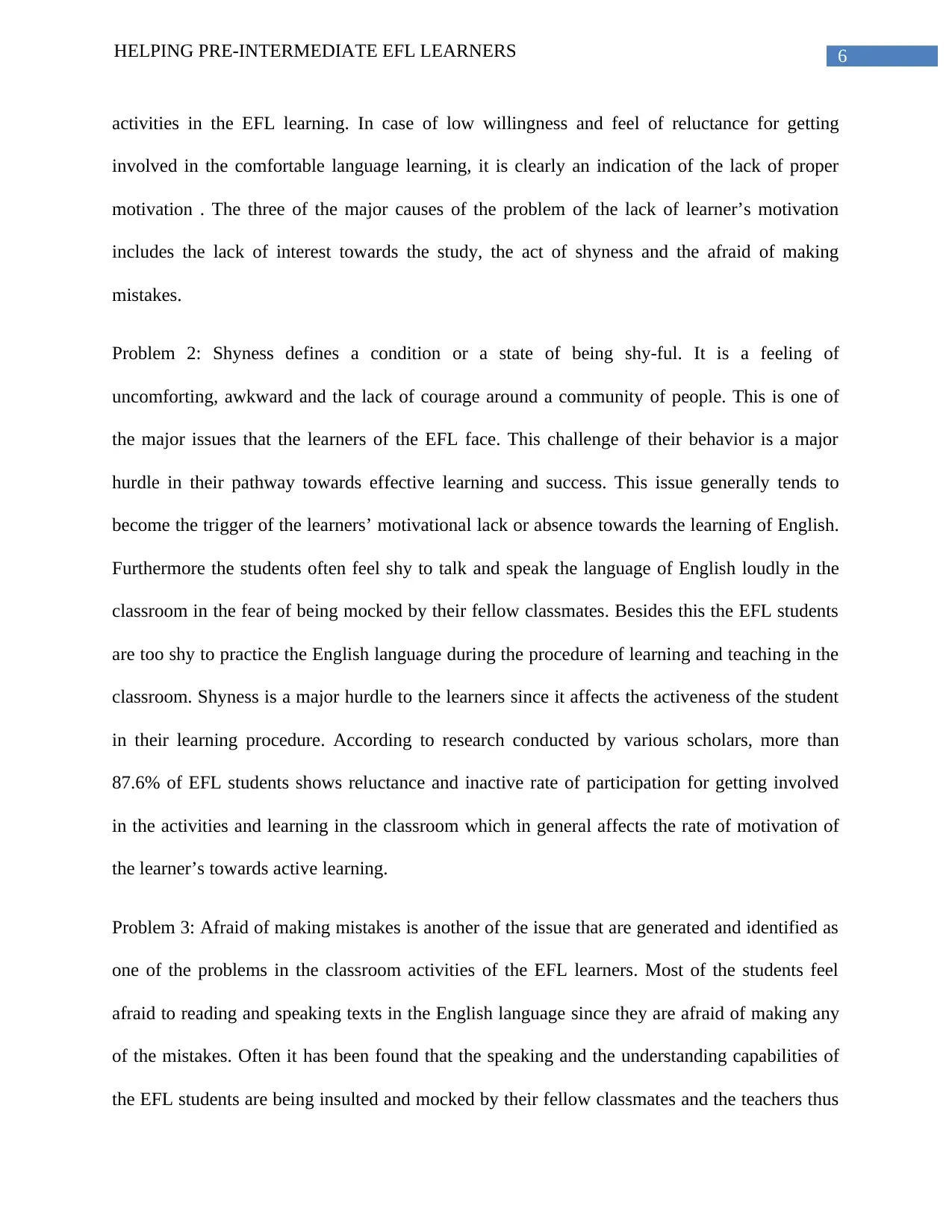
6HELPING PRE-INTERMEDIATE EFL LEARNERS
activities in the EFL learning. In case of low willingness and feel of reluctance for getting
involved in the comfortable language learning, it is clearly an indication of the lack of proper
motivation . The three of the major causes of the problem of the lack of learner’s motivation
includes the lack of interest towards the study, the act of shyness and the afraid of making
mistakes.
Problem 2: Shyness defines a condition or a state of being shy-ful. It is a feeling of
uncomforting, awkward and the lack of courage around a community of people. This is one of
the major issues that the learners of the EFL face. This challenge of their behavior is a major
hurdle in their pathway towards effective learning and success. This issue generally tends to
become the trigger of the learners’ motivational lack or absence towards the learning of English.
Furthermore the students often feel shy to talk and speak the language of English loudly in the
classroom in the fear of being mocked by their fellow classmates. Besides this the EFL students
are too shy to practice the English language during the procedure of learning and teaching in the
classroom. Shyness is a major hurdle to the learners since it affects the activeness of the student
in their learning procedure. According to research conducted by various scholars, more than
87.6% of EFL students shows reluctance and inactive rate of participation for getting involved
in the activities and learning in the classroom which in general affects the rate of motivation of
the learner’s towards active learning.
Problem 3: Afraid of making mistakes is another of the issue that are generated and identified as
one of the problems in the classroom activities of the EFL learners. Most of the students feel
afraid to reading and speaking texts in the English language since they are afraid of making any
of the mistakes. Often it has been found that the speaking and the understanding capabilities of
the EFL students are being insulted and mocked by their fellow classmates and the teachers thus
activities in the EFL learning. In case of low willingness and feel of reluctance for getting
involved in the comfortable language learning, it is clearly an indication of the lack of proper
motivation . The three of the major causes of the problem of the lack of learner’s motivation
includes the lack of interest towards the study, the act of shyness and the afraid of making
mistakes.
Problem 2: Shyness defines a condition or a state of being shy-ful. It is a feeling of
uncomforting, awkward and the lack of courage around a community of people. This is one of
the major issues that the learners of the EFL face. This challenge of their behavior is a major
hurdle in their pathway towards effective learning and success. This issue generally tends to
become the trigger of the learners’ motivational lack or absence towards the learning of English.
Furthermore the students often feel shy to talk and speak the language of English loudly in the
classroom in the fear of being mocked by their fellow classmates. Besides this the EFL students
are too shy to practice the English language during the procedure of learning and teaching in the
classroom. Shyness is a major hurdle to the learners since it affects the activeness of the student
in their learning procedure. According to research conducted by various scholars, more than
87.6% of EFL students shows reluctance and inactive rate of participation for getting involved
in the activities and learning in the classroom which in general affects the rate of motivation of
the learner’s towards active learning.
Problem 3: Afraid of making mistakes is another of the issue that are generated and identified as
one of the problems in the classroom activities of the EFL learners. Most of the students feel
afraid to reading and speaking texts in the English language since they are afraid of making any
of the mistakes. Often it has been found that the speaking and the understanding capabilities of
the EFL students are being insulted and mocked by their fellow classmates and the teachers thus
Paraphrase This Document
Need a fresh take? Get an instant paraphrase of this document with our AI Paraphraser
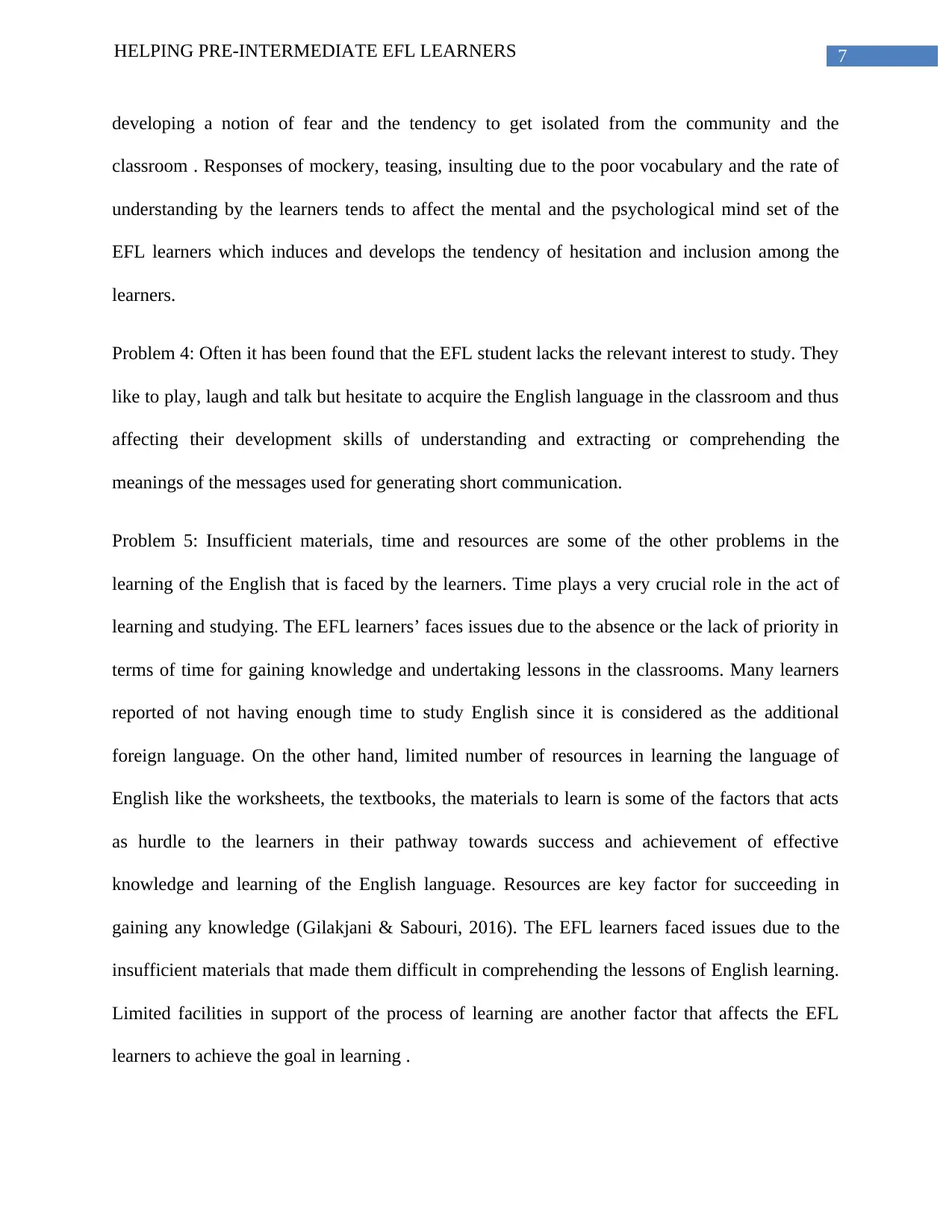
7HELPING PRE-INTERMEDIATE EFL LEARNERS
developing a notion of fear and the tendency to get isolated from the community and the
classroom . Responses of mockery, teasing, insulting due to the poor vocabulary and the rate of
understanding by the learners tends to affect the mental and the psychological mind set of the
EFL learners which induces and develops the tendency of hesitation and inclusion among the
learners.
Problem 4: Often it has been found that the EFL student lacks the relevant interest to study. They
like to play, laugh and talk but hesitate to acquire the English language in the classroom and thus
affecting their development skills of understanding and extracting or comprehending the
meanings of the messages used for generating short communication.
Problem 5: Insufficient materials, time and resources are some of the other problems in the
learning of the English that is faced by the learners. Time plays a very crucial role in the act of
learning and studying. The EFL learners’ faces issues due to the absence or the lack of priority in
terms of time for gaining knowledge and undertaking lessons in the classrooms. Many learners
reported of not having enough time to study English since it is considered as the additional
foreign language. On the other hand, limited number of resources in learning the language of
English like the worksheets, the textbooks, the materials to learn is some of the factors that acts
as hurdle to the learners in their pathway towards success and achievement of effective
knowledge and learning of the English language. Resources are key factor for succeeding in
gaining any knowledge (Gilakjani & Sabouri, 2016). The EFL learners faced issues due to the
insufficient materials that made them difficult in comprehending the lessons of English learning.
Limited facilities in support of the process of learning are another factor that affects the EFL
learners to achieve the goal in learning .
developing a notion of fear and the tendency to get isolated from the community and the
classroom . Responses of mockery, teasing, insulting due to the poor vocabulary and the rate of
understanding by the learners tends to affect the mental and the psychological mind set of the
EFL learners which induces and develops the tendency of hesitation and inclusion among the
learners.
Problem 4: Often it has been found that the EFL student lacks the relevant interest to study. They
like to play, laugh and talk but hesitate to acquire the English language in the classroom and thus
affecting their development skills of understanding and extracting or comprehending the
meanings of the messages used for generating short communication.
Problem 5: Insufficient materials, time and resources are some of the other problems in the
learning of the English that is faced by the learners. Time plays a very crucial role in the act of
learning and studying. The EFL learners’ faces issues due to the absence or the lack of priority in
terms of time for gaining knowledge and undertaking lessons in the classrooms. Many learners
reported of not having enough time to study English since it is considered as the additional
foreign language. On the other hand, limited number of resources in learning the language of
English like the worksheets, the textbooks, the materials to learn is some of the factors that acts
as hurdle to the learners in their pathway towards success and achievement of effective
knowledge and learning of the English language. Resources are key factor for succeeding in
gaining any knowledge (Gilakjani & Sabouri, 2016). The EFL learners faced issues due to the
insufficient materials that made them difficult in comprehending the lessons of English learning.
Limited facilities in support of the process of learning are another factor that affects the EFL
learners to achieve the goal in learning .
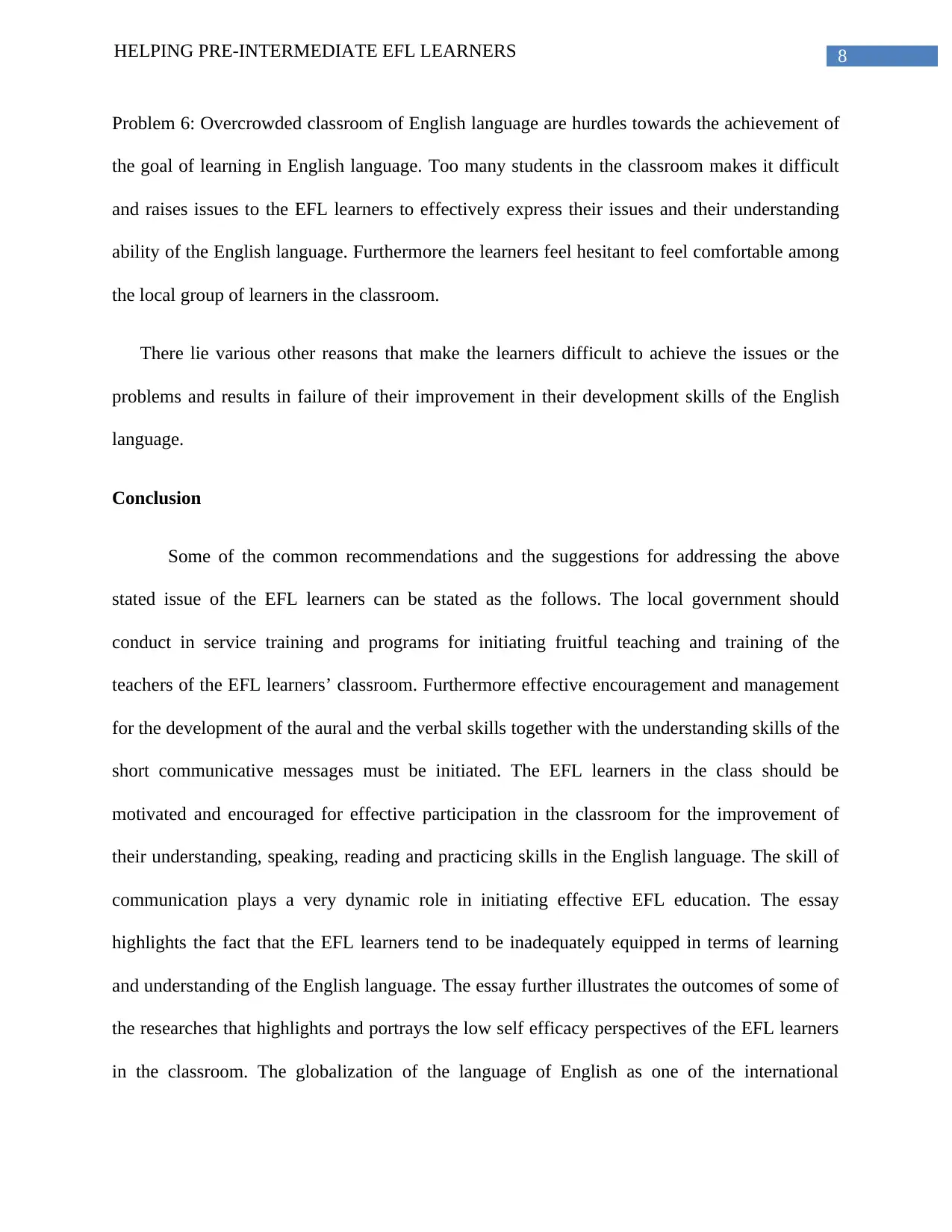
8HELPING PRE-INTERMEDIATE EFL LEARNERS
Problem 6: Overcrowded classroom of English language are hurdles towards the achievement of
the goal of learning in English language. Too many students in the classroom makes it difficult
and raises issues to the EFL learners to effectively express their issues and their understanding
ability of the English language. Furthermore the learners feel hesitant to feel comfortable among
the local group of learners in the classroom.
There lie various other reasons that make the learners difficult to achieve the issues or the
problems and results in failure of their improvement in their development skills of the English
language.
Conclusion
Some of the common recommendations and the suggestions for addressing the above
stated issue of the EFL learners can be stated as the follows. The local government should
conduct in service training and programs for initiating fruitful teaching and training of the
teachers of the EFL learners’ classroom. Furthermore effective encouragement and management
for the development of the aural and the verbal skills together with the understanding skills of the
short communicative messages must be initiated. The EFL learners in the class should be
motivated and encouraged for effective participation in the classroom for the improvement of
their understanding, speaking, reading and practicing skills in the English language. The skill of
communication plays a very dynamic role in initiating effective EFL education. The essay
highlights the fact that the EFL learners tend to be inadequately equipped in terms of learning
and understanding of the English language. The essay further illustrates the outcomes of some of
the researches that highlights and portrays the low self efficacy perspectives of the EFL learners
in the classroom. The globalization of the language of English as one of the international
Problem 6: Overcrowded classroom of English language are hurdles towards the achievement of
the goal of learning in English language. Too many students in the classroom makes it difficult
and raises issues to the EFL learners to effectively express their issues and their understanding
ability of the English language. Furthermore the learners feel hesitant to feel comfortable among
the local group of learners in the classroom.
There lie various other reasons that make the learners difficult to achieve the issues or the
problems and results in failure of their improvement in their development skills of the English
language.
Conclusion
Some of the common recommendations and the suggestions for addressing the above
stated issue of the EFL learners can be stated as the follows. The local government should
conduct in service training and programs for initiating fruitful teaching and training of the
teachers of the EFL learners’ classroom. Furthermore effective encouragement and management
for the development of the aural and the verbal skills together with the understanding skills of the
short communicative messages must be initiated. The EFL learners in the class should be
motivated and encouraged for effective participation in the classroom for the improvement of
their understanding, speaking, reading and practicing skills in the English language. The skill of
communication plays a very dynamic role in initiating effective EFL education. The essay
highlights the fact that the EFL learners tend to be inadequately equipped in terms of learning
and understanding of the English language. The essay further illustrates the outcomes of some of
the researches that highlights and portrays the low self efficacy perspectives of the EFL learners
in the classroom. The globalization of the language of English as one of the international

9HELPING PRE-INTERMEDIATE EFL LEARNERS
language has changed dramatically and induced alteration of the procedure and the courses of
teaching the language as a measure or a tool for effective communication. Thus it is essential for
the EFL learners to adapt and communicate well in the language to be in the part of
globalization.
language has changed dramatically and induced alteration of the procedure and the courses of
teaching the language as a measure or a tool for effective communication. Thus it is essential for
the EFL learners to adapt and communicate well in the language to be in the part of
globalization.
Secure Best Marks with AI Grader
Need help grading? Try our AI Grader for instant feedback on your assignments.
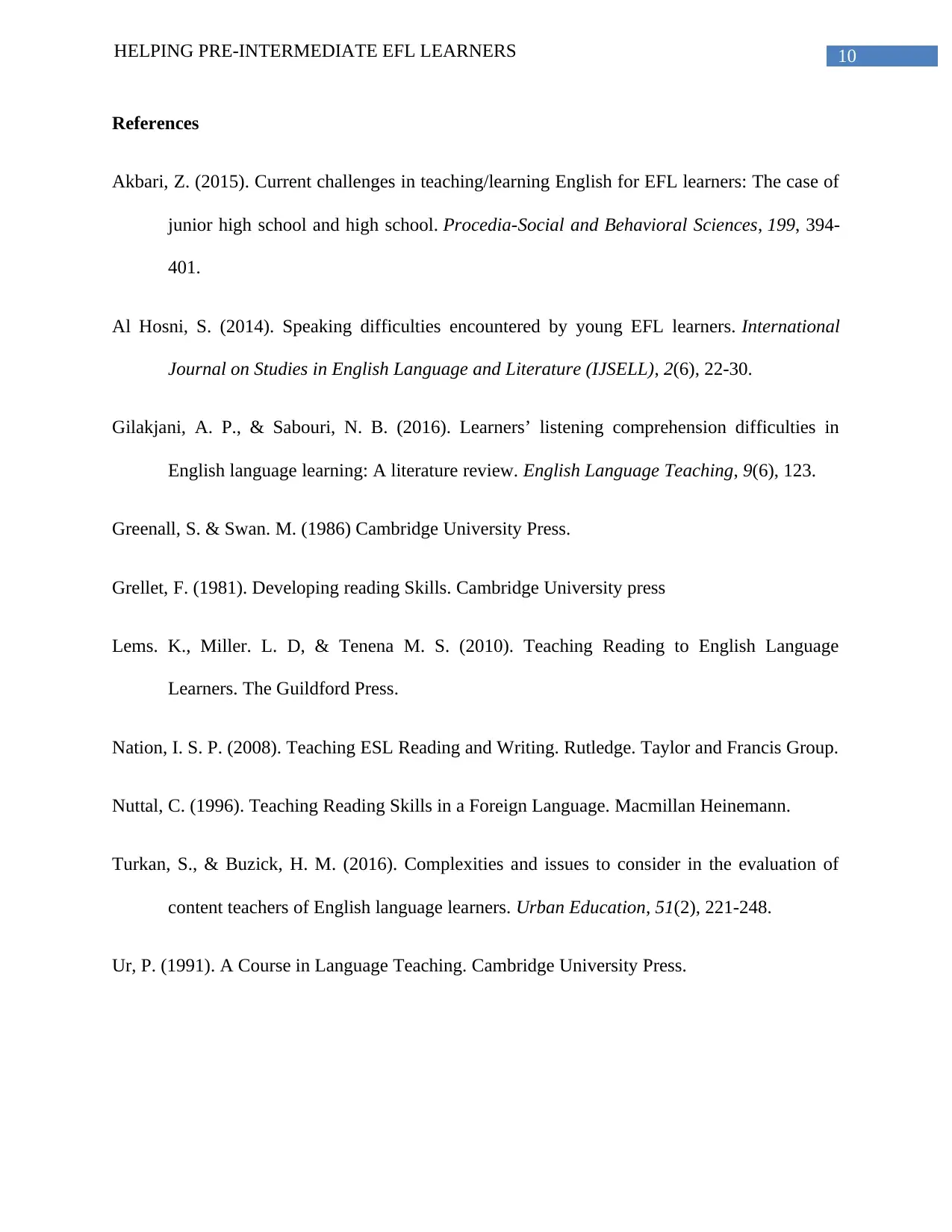
10HELPING PRE-INTERMEDIATE EFL LEARNERS
References
Akbari, Z. (2015). Current challenges in teaching/learning English for EFL learners: The case of
junior high school and high school. Procedia-Social and Behavioral Sciences, 199, 394-
401.
Al Hosni, S. (2014). Speaking difficulties encountered by young EFL learners. International
Journal on Studies in English Language and Literature (IJSELL), 2(6), 22-30.
Gilakjani, A. P., & Sabouri, N. B. (2016). Learners’ listening comprehension difficulties in
English language learning: A literature review. English Language Teaching, 9(6), 123.
Greenall, S. & Swan. M. (1986) Cambridge University Press.
Grellet, F. (1981). Developing reading Skills. Cambridge University press
Lems. K., Miller. L. D, & Tenena M. S. (2010). Teaching Reading to English Language
Learners. The Guildford Press.
Nation, I. S. P. (2008). Teaching ESL Reading and Writing. Rutledge. Taylor and Francis Group.
Nuttal, C. (1996). Teaching Reading Skills in a Foreign Language. Macmillan Heinemann.
Turkan, S., & Buzick, H. M. (2016). Complexities and issues to consider in the evaluation of
content teachers of English language learners. Urban Education, 51(2), 221-248.
Ur, P. (1991). A Course in Language Teaching. Cambridge University Press.
References
Akbari, Z. (2015). Current challenges in teaching/learning English for EFL learners: The case of
junior high school and high school. Procedia-Social and Behavioral Sciences, 199, 394-
401.
Al Hosni, S. (2014). Speaking difficulties encountered by young EFL learners. International
Journal on Studies in English Language and Literature (IJSELL), 2(6), 22-30.
Gilakjani, A. P., & Sabouri, N. B. (2016). Learners’ listening comprehension difficulties in
English language learning: A literature review. English Language Teaching, 9(6), 123.
Greenall, S. & Swan. M. (1986) Cambridge University Press.
Grellet, F. (1981). Developing reading Skills. Cambridge University press
Lems. K., Miller. L. D, & Tenena M. S. (2010). Teaching Reading to English Language
Learners. The Guildford Press.
Nation, I. S. P. (2008). Teaching ESL Reading and Writing. Rutledge. Taylor and Francis Group.
Nuttal, C. (1996). Teaching Reading Skills in a Foreign Language. Macmillan Heinemann.
Turkan, S., & Buzick, H. M. (2016). Complexities and issues to consider in the evaluation of
content teachers of English language learners. Urban Education, 51(2), 221-248.
Ur, P. (1991). A Course in Language Teaching. Cambridge University Press.
1 out of 11
Related Documents
Your All-in-One AI-Powered Toolkit for Academic Success.
+13062052269
info@desklib.com
Available 24*7 on WhatsApp / Email
![[object Object]](/_next/static/media/star-bottom.7253800d.svg)
Unlock your academic potential
© 2024 | Zucol Services PVT LTD | All rights reserved.





